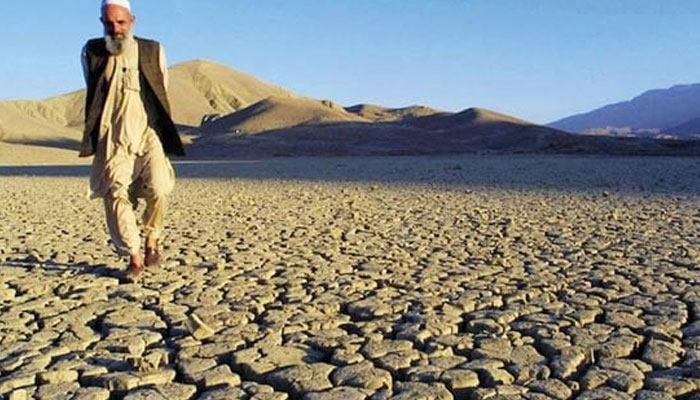Climate change: Cabinet approves National Adaptation Plan
Pakistan is “on the world’s radar as a flashing hotspot for climate disasters, says Sherry Rehman
KARACHI: Pakistan’s federal cabinet unanimously approved the National Adaptation Plan (NAP) prepared by the Ministry of Climate Change and Environmental Coordination (MoCC&EC) on Wednesday (July 26).
The NAP framework aims at implementing large-scale environmental adaptation, building climate resilience, promoting inclusivity and facilitating collaboration among different stakeholders, and serves as an effective tool for climate finance mobilisation.
According to a press release issued by the MoCC&EC, Federal Minister for Climate Change Senator Sherry Rehman believes that Pakistan is “on the world’s radar as a flashing hotspot for climate disasters, and when your house is on fire, one has to take responsibility.”
She says, “After the 2022 mega floods impacted 33 million people of Pakistan and broke all records of monsoon flooding in the world, a national adaptation plan (NAP) became an urgent need for the country.”
One important aspect of the framework is that it encourages collaboration between different departments. Rehman explains, “The document outlines for the federal ministries what they need to do and how they have to change their development planning, and every focal ministry must act to climate-proof its actions and strategies. Similarly, the provinces will form the heart of the execution of this plan, along with local bodies,” adding that it takes a whole-of-government approach.
The National Adaptation Plan Pakistan 2023 has 10 guiding principles: integrate climate adaptation; think strategically; make evidence-based decisions; promote nature-based solutions; act locally; leave no one behind; think ahead and stay flexible; address inequity; coordinate and collaborate; and build capacity and knowledge.
The framework prioritises five areas: agriculture-water nexus, natural capital, urban resilience, human capital and disaster risk management (DRM). For the agriculture-water nexus initiatives are divided into three categories: short-term (2023-2025), medium-term (2025-2030), and long-term (2030 onwards). Adaptation strategies in this area will focus on incentivizing farmers for climate-smart practices, modernizing irrigation services, devising a long-term agriculture growth strategy, and managing river flow variability under climate scenarios.
For natural capital, adaptation strategies include mainstreaming sustainable land management, promoting integrated watershed management, improving water quality through better wastewater management, investing in coastal and marine resources, and addressing the air pollution-climate change nexus. To meet the goal of urban resilience, the authorities concerned will focus on mainstreaming climate adaptation across all levels of government, improving land regulation, bolstering climate-smart municipal services, leveraging nature-based solutions for climate risks, and developing financing instruments for green urbanization.
The framework’s fourth priority is Pakistan’s human capital. The key adaptation strategies include mainstreaming climate adaptation in health and education policies, enhancing climate resilience through disaster emergency preparedness and response, and building workforce capacities to address and adapt to climate risks.
The fifth area is disaster risk management (DRM). The key adaptation strategies will focus on understanding climate and disaster risk through advanced early warning systems and data-driven analysis, strengthening disaster risk governance with clear policies and coordination mechanisms, investing in risk reduction for community and infrastructure resilience, and enhancing disaster preparedness for effective response.
Prime Minister Shehbaz Sharif has also praised Senator Sherry Rehman for her “excellent work”.
-
 Jennifer Aniston Already Decided Her Wedding Dress?
Jennifer Aniston Already Decided Her Wedding Dress? -
 Prince Harry, Meghan’s Hollywood Party Drama Exposes Chaotic PR Strategy
Prince Harry, Meghan’s Hollywood Party Drama Exposes Chaotic PR Strategy -
 Jennifer Garner Reacts To Savannah Guthrie's Video As Search For Nancy Guthrie Continues
Jennifer Garner Reacts To Savannah Guthrie's Video As Search For Nancy Guthrie Continues -
 Bad Bunny Leaves Fans Worried With Major Move After Super Bowl Halftime Show
Bad Bunny Leaves Fans Worried With Major Move After Super Bowl Halftime Show -
 Captain Jason Talks Personal Hardships He Faced Ahead Of 'Below Deck' Season 4
Captain Jason Talks Personal Hardships He Faced Ahead Of 'Below Deck' Season 4 -
 Anti-monarchy Group Reacts To Prince William, Kate Middleton Statement On Epstein Scandal
Anti-monarchy Group Reacts To Prince William, Kate Middleton Statement On Epstein Scandal -
 Andrew 'must' Apologize Not Wider Royal Family For Jeffrey Epstein Links
Andrew 'must' Apologize Not Wider Royal Family For Jeffrey Epstein Links -
 Super Bowl 2026: Why Didn't Epstein Survivors Ad Air On TV?
Super Bowl 2026: Why Didn't Epstein Survivors Ad Air On TV? -
 'Harry Potter' TV Series Exec Teases 'biggest Event In Streaming': Deets
'Harry Potter' TV Series Exec Teases 'biggest Event In Streaming': Deets -
 Camila Mendes Finally Reveals Wedding Plans With Fiancé Rudy Mancuso
Camila Mendes Finally Reveals Wedding Plans With Fiancé Rudy Mancuso -
 Beatrice, Eugenie Blindsided By Extent Of Sarah Ferguson’s Epstein Links
Beatrice, Eugenie Blindsided By Extent Of Sarah Ferguson’s Epstein Links -
 Girl And Grandfather Attacked In Knife Assault Outside Los Angeles Home
Girl And Grandfather Attacked In Knife Assault Outside Los Angeles Home -
 Super Bowl Halftime Show 2026: What Did Trump Say About Bad Bunny?
Super Bowl Halftime Show 2026: What Did Trump Say About Bad Bunny? -
 Piers Morgan Defends Bad Bunny's Super Bowl Performance, Disagrees With Trump Remarks
Piers Morgan Defends Bad Bunny's Super Bowl Performance, Disagrees With Trump Remarks -
 Andrew Lands In New Trouble Days After Royal Lodge Eviction
Andrew Lands In New Trouble Days After Royal Lodge Eviction -
 Instagram, YouTube Addiction Case Trial Kicks Off In California
Instagram, YouTube Addiction Case Trial Kicks Off In California




